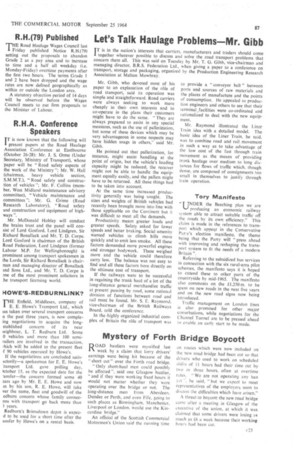Let's Talk Haulage Problems—Mr. Gibb
Page 91

If you've noticed an error in this article please click here to report it so we can fix it.
I T is in the nation's interests that carriers, manufacturers and traders should come together wherever possible to discuss and solve the road transport problems that concern them all. This was said on Tuesday by Mr. T. G. Gibb, vice-chairman and managing director, B.R.S. Federation Ltd., when giving a paper to a conference on transport, storage and packaging, organized by the Production Engineering Research Association at Melton Mowbray.
Mr. Gibb, who devoted most of his paper to an explanation of the role of road transport, said its operation was simple and straightforward. Road carriers were always seeking to work more cheaply in their own interests and to co-operate in the plans their customers might have to do the same. "They are always prepared to assist in any special measures, such as the use of palletization, but some of these devices which may be very advantageous in some respects may have hidden snags in others," said Mr. Gibb.
He pointed out that palletization, for instance, might assist handling at the point of origin, but the vehicle's loading capacity might be reduced, the receiver might not be able to handle the equipment equally easily, and the pallets might have to be returned. All these things had to be taken into account.
At the same time increased productivity generally was being sought. The sizes and weights of British vehicles had recently been brought more into line with those applicable on the Continent but it was difficult to meet all the demands.
Productivity meant greater loads and greater speeds. Safety asked for lower speeds and better braking. Social amenity wanted vehicles to climb hills more quickly and to emit less smoke. All these factors demanded more powerful engines and stronger bodywork. These weighed more and the vehicle could therefore carry less. The balance was not easy to find and all these factors bore directly on the ultimate cost of transport.
If the railways were to be successful in regaining the trunk haul of a lot of the long-distance general merchandize traffic at present passing by road, some rational division of functions between road and rail must be found, Mr. S. E. Raymond, vice-chairman of the British Railways Board, tote] the conference.
In the ,highly organized industrial complex of Britain the role of transport was
to provide a "conveyor belt" between ports and sources of raw materials and the places of manufacture and the points of consumption, He appealed to production engineers and others to see that their terminal facilities were co-ordinated and rationalized to deal with the new equipment.
Mr. Raymond illustrated the Liner Train idea with a detailed model. The basic idea of the Liner Train, he said, was to combine road and rail. movement in such a way as to take advantage of the low cost of the fast through train movement as the means of providing trunk haulage over medium to long distances for flows of traffic which, though dense, are composed of consignments too small in themselves to justify through train operation.
Tory Manifesto
" 1 TNDER the Beeching plan we are %-) producing an economic railway sk stem able to attract suitable traffic off the roads by its own efficiency." This claim is made in the references to transport which appear in the Conservative Pan y's election manifesto, the theme being that the Party will "press ahead with improving and reshaping the transport system to fit the needs of a modern Britain ".
Referring to the subsidized bus services in connection with the six rural-area pilot schemes, the manifesto says it is hoped to extend these to other parts of the countryside by mid-1965. The manifesto also comments on the f1.250 m. to be spent on new roads in the next five years and on the new road signs now being introduced.
Traffic management on London lines is also promised for other major conurbations, while negotiations for the Channel Tunnel are to be pressed ahead to enable an early start to be made.






































































































































































































































































































































































































